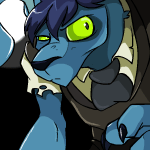 Neopian Public Speaking 101
by parody_ham
--------
Public speaking is a source of dread for many Neopians, but for some, the process comes naturally. In this guide, we will explore what makes an effective speech through the eyes of our beloved Neopian leaders and heroes. They will provide tips of the trade as well as ways in which your speech can engage and excite your audience. ~~~

Lisha: Well, the first thing any speech writer needs to know is the importance of background research. In her paws is a textbook: The History of Three Medieval Kingdoms. Without knowledge on the subject, you're gonna be in trouble. I never present anything without first reading a book about the topic. Well, okay, more like ten to twenty books. She fiddles with her glasses, grinning sheepishly. Maybe I go a little bit overboard, but it doesn't hurt to be well-prepared! Even if you know a subject well—as I know a lot about role-play gaming and Neoquest I—it always helps to double check your knowledge with a credible source. Once you complete the research phase of the speech, you'll have a good list of resources with which you can defend your points if need be. Each and every source should be adapted into your speech and given proper credit, too.

Lord Darigan: Over the years, I have learned the importance of practice. Do not let the charisma of Neopian leaders fool you; they too must prepare before each and every oration. Early in my years as a Lord, facing the citadel's masses proved an arduous affair, especially if my speech was hastily prepared. No doubt it surprises you that the majority of my speeches were written down and edited before their official presentation.
Although not all Neopians will go about planning a speech this way, I often begin by writing an outline. A topic sentence is often followed by a sequence of bullet points, perhaps even a paragraph if a particular order is important. Once the parchment is filled, I take part in three different trials—stages, if you will—to increase my recall of the speech. First is in front of a mirror, preferably a tall one. Watch your movements; the mirror will show your every fault. You may read off of the parchment the first couple of times, but do not depend on it. Nothing is more boring for a listener than a presenter who reads from their paper. Parchment cards do work in a pinch, but if only if they are numbered. The second trial is with a family member or close friend—an adviser in my case. Galgorrath often listens to my speeches at least once and provides feedback on them. Be cautioned: those that are close to you are not always likely to point out the biggest flaws in your presentation. For example, my adviser's commentary is overwhelmingly positive. He probably believes such words will encourage me. But in a sense, his type of support is the reinforcement that any leader needs to thrive. The third trial, although you are welcome to practice more if you so desire, should be with someone you know will give honest but fair critique regardless of sentimental attachment. Master Vex is one of the bluntest Neopians I know. Perhaps it is a reflection of his job as a prison guard, but I digress. Despite the fact that I am his Lord, he does not hesitate to provide me with honest feedback. And before you say it, yes, I know I do not smile. He attempts to smile, but it ends up looking like a deeper set frown. It is a work in progress.

King Hagan: To be treated as a scholar, you must first dress like one. He gestures to his outfit. A wise Neopian once said, "Fortunate is the one who understands that success is equivalent to the allure of the sophisticated." I find a good doublet coupled with a fur-trimmed cape helps to provide a most impressive sight. It is foolish to believe that an outfit alone makes a presenter great; nonetheless, it presents a more commanding presence. We are a society that places importance on symbols. A golden crown signifies to my people that I am their ruler just as a suit jacket represents someone worthy of their respect. If your audience is such that impressive wear is unneeded, carry on as you see best. Many an impressive scholar has arrived wearing cotton tunic and blue denim trousers, but they are well aware of their audience. And lest I forget, I leave you with a note of utmost importance: thank your audience for their time. Let them know you appreciate their interest in scholarly pursuit. Without them, there would be no symposiums, no meetings, and no sharing of information. A most pitiable sight this would be!

Jazan: Being a leader is no easy feat. Each time I've attempted to speak, the shrill cacophony of fan girls bombards my ears like the sound of tuneless Petpets. I never asked for this attention but—oh. You seek advice rather than my rants. He sighs. Fine. I'm only here because of Nabile, anyway. Capture your audience's attention with a strong introduction. If needed, mix these words with bright, colorful objects. Together, this combination has worked wonders in quieting obsessive fans. Most of the time, that is. Introductions need not be elaborate; it depends on the audience. They can be as simple as stating your name and your topic, or as complex as following your name by a related anecdote. Some say that energy and enthusiasm are important in capturing a listener's attention. But too much energy and you'll be a distraction. Like Hanso. It is important to keep them interested, but avoid being the center of attention.

Brynn: From personal experience, I can recommend that long hair should be tied and out of the way. I've felt firsthand the consequences of forgetting a hair band and let me tell you—it's not fun. For Brightvalian guards, it could mean the difference between getting your armor off painlessly and peeling off the metal helmet from your head (and tearing out half of your fur in the process)! Public speaking may not have the same levels of danger as being in the field, but hair can still be a huge distraction—especially if you're one to toy with whatever is around. And if you look nervo—I mean excited—it'll make the audience uncomfortable, definitely not something you want to do.
You probably noticed my avoidance of the word "nervous" before. Here's why: it has a really negative connotation. Saying you are nervous to an audience may turn them off. It's almost like telling them, "this speech isn't going to be good because..." If you really want to express your nerves, say you're "excited" instead. It will garner a much more positive response. Try it out! I'm sure you'll notice a difference. Also, I've long encouraged my fellow guardsmen (and guardswomen) to maintain proper posture. Standing up straight shows listeners that you are confident and believe in the message that you are trying to convey. Your wings, if you have them, should be folded against your body, too. Avoid flapping them when excited, or you may blow away all of your notes. Also, remember to keep your paws behind your back—one cupped over another—and your tail steady. This will help you to look professional as well as self-assured. It can be difficult to keep your nerves in check and it takes practice to catch the hiccups. Nonetheless, such a skill can be mastered.

Bruno: You'd like to hear my thoughts on making a good speech? I suppose I can have a go at it.
The best speeches are interactive. Potions, differently sized vines, tomes that show where Neopians are buried, mysterious lockets from abandoned houses... yeah, all of these are examples of good props. Either that or they're throwbacks to the Tale of Woe. He shrugs. Your call. Anyway, adding visuals can make a speech more memorable, in my opinion. You've got to make sure your props are used wisely, though. I mean, I like dancing ghost Meepits as much as the next Gelert, but unless you're talking about feeding them juice, it might be a little... off topic or distracting. Sorry, Sophie. The Gelert rubs his large, grotesque neck before continuing to speak. If you're interested in a more old fashioned approach, there's always the poster, pictures, or even food. Okay, I'll admit it; I'm a big guy. When food is added to the mix of a Neopian's presentation, they instantly have my attention. He begins to salivate. Right. Sorry, Times readers. All of this food talk is making me kind of hungry! Before I go, let me just say another reason why props are so helpful: multiple exposures to the information. I know this sounds like photography jargon, but it can be broken down. Say you hear about something for the first time, but don't catch every detail. Then, after they finish speaking, the presenter hands you an object that represents their topic. It reinforces their point by appealing to multiple senses. Sight, hearing, and touch, in this case. Oh, but try not to appeal to all of those things at once or you'll have a sensory overload. Definitely not a good thing. Anyway, if you want to make a strong impression on your audience, props are a must have. He stares at the reporter for a while. So... was that good? It was? Great, happy to help.

Hanso: Hello, Neopia! You've made the right choice by contacting me for advice. I'm the master of public speaking. He holds up a Hanso Charisma Charm. This handsome little Pant Devil's got the right idea here: smiling is important. Okay, okay, so maybe your smiles won't destroy wraiths like mine, but they will still engage your listener. It shows them that you want to be there. (Whether or not you do is another story, but hey! They don't have to know that!) Indulge them with your pearly whites. Let them gaze upon them and—oh, fine, Brynn. I was just having a little fun. He pouts. Anyway, as I was saying before being interrupted, grace them with your grin, but do it with some solid eye contact. If you're not a fan of locking gazes with strangers, don't worry! Just pretend everyone in the audience is me. It's a foolproof strategy as I'm sure Brynn here would agre—ow! In the background, Brynn says, "It was just a tap, Hanso. Stop being so melodramatic." Fine. Serious Hanso time. Got it. If looking at a room of roguish charm doesn't help, try the revolving door approach at eye contact. In other words, look at one person for a second before switching to the next. That way, you grant them the connection they seek and prevent the internal excitement. And if that doesn't work, keep your gaze upon their foreheads... and imagine you're staring at a blue Ixi's head of hair, pony-tied for styl—wait, wait! I had more points to share! He is dragged away from the interviewing booth.

Jerdana: At the end of every formal speech, a wise leader will ask for questions, comments, or concerns. When singling out a hand-raising Neopian, use your paws wisely. Instead of a one-finger point, use the "Miss Altador" gesture, a technique I learned from watching Altadorian beauty pageants. Cup your dominant paw like so she demonstrates the gesture and extend it towards the question asker. Addressing the Neopian by name at this point would also work well. In nearly all cases, this approach looks far less intimidating than a normal point and it is a method I have found very successful when asking questions from our people. Another thing to keep in mind: have a good time. Your audience wants to see a presenter who is passionate about their subject, so enjoy yourself. Of course, keep this within reason. Have too much fun and they might not take you seriously. I know the council always appreciated it when Sasha, the Dancer, moved about the front of the room, presenting herself with energy and enthusiasm. But then again, if the speech does not call for such behavior, a more serious approach will be necessary. For example, during a more pressing time in our history, things were quite different. I can still remember our fair city at its darkest hour. She takes a deep breath. It had been after that traitor turned on us. That day, we only did what had to be done—I perhaps most of all. It is with sincere hope that you are never forced to present under such conditions. Oh. She chuckles nervously. I suppose I drifted off-topic there. My apologies. What I meant to say is to tackle every speech with the wisdom of a great leader. Let your people know that their inquiries are important and address them to the best of your ability. If your current set of knowledge does not provide you an answer, do not attempt to sway them with empty words and guesses. When possible, obtain their contact information and give them the answer they seek at a later time. It is an action well-received by the masses, I have found.

Jeran: I'm your last interviewee? He laughs. Alright, that's fine with me. Well, I guess the most important thing is to believe in yourself. No one in the room is going to know the material better than you do. Remember all of the work that went into your speech, the background research, the practice, the delivery. Be proud of the effort you put into your work and remember—you can do this. I know where you're coming from, though. It can be hard to have the confidence to go on, especially when you are put into a position of leadership or are expected to be a voice of the people. Believe it or not, I've had my fair share of doubts as well. We all have! But remember, I believe in you. I know, it probably sounds silly. We might never meet in person, but a little encouragement can go a long way. Keep practicing, keep trying. You have someone in Meridell who'll always be on your side! ~~~ With that, our interviews have concluded. Have any questions about the article? Want to know more about the subject? Feel free to contact Haibara, Neopian Times journalist and Brightvale University Senior.
|